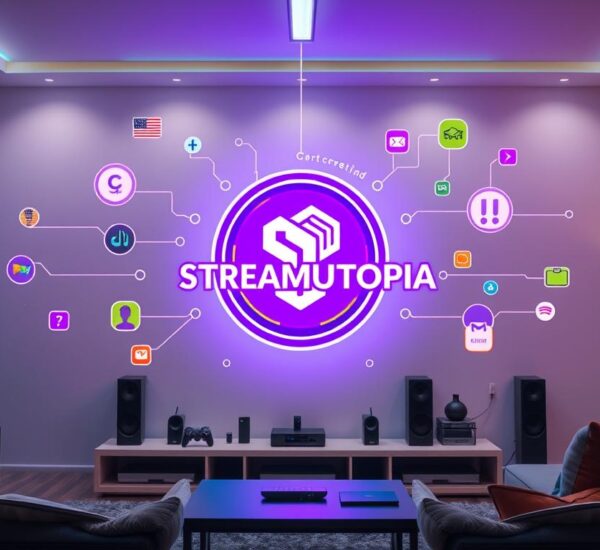Did you know that over 70% of IPTV viewers express dissatisfaction with their TV providers’ search implementation?
As technology continues to evolve, virtual assistants and voice search have become increasingly popular. This trend has extended to the world of IPTV, where viewers can now optimize their viewing experience by using voice commands to search for content and control their devices.
In this article, we will explore the benefits and strategies for optimizing IPTV for voice search and virtual assistants like Siri and Alexa. By integrating voice control capabilities, IPTV operators can enhance the user experience, making content search and navigation more seamless.
Key Takeaways:
- Integrating voice search and virtual assistants with IPTV can enhance the user experience.
- Traditional TV remotes have limitations that make content search a tedious task.
- Voice recognition technology improves the speed and accuracy of content search.
- IPTV operators need to ensure their infrastructure supports voice recognition on the hardware level.
- Viewer demand for voice control in IPTV is on the rise.
The Weakness of TV Remotes
Traditional TV remotes have several limitations that make navigating and searching for content a tedious task. Users often struggle with entering search queries using a remote’s on-screen keyboard, leading to frustration and disengagement. In fact, surveys have shown that a significant number of viewers have turned off their TVs because they couldn’t find the content they wanted. Over 70% of respondents expressed dissatisfaction with their TV providers’ search implementation. These limitations highlight the need for alternative methods of interaction, such as voice search integration and virtual assistant compatibility.
The Power of Voice Recognition
Voice control for IPTV offers a more intuitive and user-friendly way of interacting with IPTV services. By simply activating the remote control and using voice commands, users can effortlessly navigate through channels, search for specific content, and control playback. This enhanced user experience not only simplifies the process but also improves the speed and accuracy of content search.
Voice recognition technology plays a crucial role in enabling voice control for IPTV. When users speak into the remote control, their voice commands are processed in the cloud. The technology converts these commands into text queries that the IPTV system understands and executes. This seamless integration of voice recognition technology enhances the overall user experience of IPTV services.
One significant advantage of voice control is its user-friendly nature. Users with disabilities or those who find traditional input methods challenging can benefit greatly from voice recognition technology. Voice control provides an inclusive and accessible option for all users, ensuring everyone can enjoy IPTV services with ease.
Moreover, voice control for IPTV significantly improves the search experience. With voice search, users can simply speak their desired content, eliminating the need for tedious text input using on-screen keyboards. This streamlines the process, allowing viewers to find the content they want quickly.
Voice recognition technology also contributes to the overall enhanced user experience. By eliminating the need for manual input, users can control their IPTV services effortlessly and enjoy a more seamless viewing experience. The natural and intuitive interface provided by voice control enhances user satisfaction and engagement.
In summary, voice recognition technology enables user-friendly voice control for IPTV, offering an enhanced user experience. It simplifies the search process, improves accessibility, and provides a seamless and intuitive interface for controlling IPTV services.
Integrating Voice Search in IPTV
To optimize IPTV for voice search, operators must focus on integrating voice recognition into their infrastructure. This entails providing set-top boxes with built-in microphones, codecs, and internet connectivity. Additionally, a cloud-based streaming platform is essential for managing and controlling the voice recognition system. The platform handles vital functions such as user authentication, content management, and electronic program guides.
By integrating voice search capabilities into the IPTV infrastructure, operators enable users to effortlessly search for and access their desired content using voice commands. This seamless integration significantly improves the overall user experience, making content discovery and navigation more convenient and intuitive.
| Benefits of Integrating Voice Search in IPTV |
|---|
| Enhanced user experience |
| Effortless content discovery |
| Intuitive navigation |
| Increase user engagement |
| Improved accessibility for users with disabilities |
Integrating voice search in IPTV infrastructure is a critical step towards creating a more user-friendly and efficient viewing experience. By seamlessly incorporating voice command recognition, operators enable viewers to access their favorite shows and movies with ease, enhancing user satisfaction and attracting more subscribers to their IPTV services.

User Demand for Voice Control
Surveys have indicated that there is a significant demand for voice control in IPTV services. With the increasing prevalence of voice-activated devices and the popularity of voice search, viewers are highly interested in utilizing voice control for their IPTV experiences. In fact, research has shown that 20% of users already interact with their TV or set-top box via voice commands. This demand is expected to grow as younger generations, who are accustomed to using voice assistants, gain purchasing power.
Viewer interest in voice control stems from the convenience and efficiency it offers. Many smartphone users are already familiar with utilizing voice interfaces regularly and desire to extend this functionality to other devices, including their TVs. By providing voice control capability, IPTV operators can meet this demand and give themselves a competitive advantage in the market.
The Rise of Voice-Activated Devices
One factor driving the demand for voice control in IPTV is the increasing popularity of voice-activated devices. Voice-activated devices like smart speakers and virtual assistants have become commonplace in households around the world. This growth is due to their ability to simplify tasks, provide quick answers, and offer hands-free convenience. As viewers become accustomed to interacting with devices using their voice, they expect the same functionality for their TV viewing experience.
User Preference for Convenient and Intuitive Interfaces
Another reason for the demand for voice control is the preference for convenient and intuitive interfaces. Traditional TV remotes can be cumbersome, and viewers often struggle with entering search queries using on-screen keyboards. Voice control eliminates the need for manual input and provides a more natural and streamlined way of interacting with IPTV services. This preference for a user-friendly interface drives the demand for voice control in IPTV.
Creating an Enhanced Viewing Experience
By meeting the demand for voice control, IPTV operators can create an enhanced viewing experience for their subscribers. Voice search enables viewers to quickly find the content they want without the need for manual navigation. It also opens up opportunities for personalized content recommendations based on individual preferences, enhancing viewer satisfaction and engagement.
| Survey Results: Viewer Interest in Voice Control | |
|---|---|
| Percentage of users who interact with their TV or set-top box via voice commands | 20% |
| Expected growth in demand for voice control as younger generations gain purchasing power | High |
| Reasons for viewer interest in voice control |
|
In conclusion, there is a strong demand for voice control in IPTV services driven by viewer interest in voice-activated devices, preference for convenient interfaces, and the desire for an enhanced viewing experience. IPTV operators can capitalize on this demand by integrating voice control functionality, providing a competitive edge and attracting more subscribers.
The Benefits of Voice Search for Viewers
Voice search revolutionizes the TV search experience, providing viewers with a seamless and user-friendly way to find their favorite content. By simply using voice commands, users can effortlessly navigate through channels and discover personalized recommendations based on their preferences. This enhanced TV search experience improves user satisfaction and encourages longer viewing times.
One of the key benefits of voice search is the elimination of the tedious task of navigating through on-screen keyboards or menus. Users can avoid the frustration of manually typing in search queries and instead speak their desired content directly. This streamlined process saves time and effort, allowing viewers to quickly find the shows, movies, or channels they want to watch.
Another advantage of voice search is the ability to receive personalized content recommendations. With advanced algorithms analyzing user preferences and viewing habits, IPTV platforms can suggest relevant shows, movies, and channels tailored to each individual. This personalized touch enhances the viewing experience, making it more enjoyable and satisfying for users.
By enabling voice search, viewing content becomes a social and interactive experience. Users can easily search for and enjoy content with their partners, families, and friends. Whether it’s finding a movie to watch together or discovering a new show to binge, voice search fosters shared entertainment experiences, creating connections and fostering enjoyment.
Overall, voice search improves the TV search experience, providing viewers with a convenient and personalized way to find their favorite content. By eliminating the limitations of traditional search methods, users can navigate through channels effortlessly and discover new and exciting shows that align with their interests. This enhanced user satisfaction leads to longer viewing times, ultimately benefiting both viewers and IPTV operators.
The Benefits of Voice Search for Viewers:
- Improved TV search experience
- Personalized content recommendations
- Enhanced user satisfaction
Considerations for IPTV Operators
As IPTV operators seek to optimize their services for voice search and virtual assistants, there are several key considerations to keep in mind:
1. Infrastructure for Voice Control
Ensuring that the infrastructure supports voice recognition is crucial for a successful implementation. This includes having the necessary hardware and software capabilities to process voice commands effectively. From built-in microphones to codecs and internet connectivity, a robust infrastructure paves the way for seamless voice control.
2. Compatibility with Virtual Assistants
Virtual assistants like Siri and Alexa have gained wide popularity and compatibility with them is essential. By integrating IPTV services with popular virtual assistant platforms, operators can provide a more intuitive and user-friendly experience. This compatibility allows users to control their IPTV services using voice commands through their trusted virtual assistants.
3. Cost-Effectiveness of Voice Optimization
Implementing voice optimization requires a financial investment. IPTV operators need to carefully evaluate the cost-effectiveness of integrating voice control into their services. This evaluation should consider the potential benefits it can bring in terms of enhanced user experience, increased viewer engagement, and customer retention.
4. Monitoring Research and Development
Voice recognition technology is constantly evolving, with ongoing research and development in this field. IPTV operators should stay up-to-date with the latest advancements in voice recognition technology to ensure that their services remain competitive and provide a cutting-edge user experience.
By taking into account these considerations, IPTV operators can optimize their services for voice search and virtual assistants, providing a seamless and user-friendly experience for their viewers.

Future Trends in IPTV Optimization
As the world of IPTV continues to evolve, exciting future trends are emerging that have the potential to revolutionize the way we experience television. These trends include increasing personalization, integration with the Internet of Things (IoT), enhanced interactivity, and augmented reality integration. By staying informed about these trends, IPTV operators can ensure they remain competitive in the evolving market.
Increasing Personalization
The future of IPTV optimization lies in advanced algorithms and machine learning techniques that can personalize the viewing experience for individual users. By analyzing user preferences, viewing habits, and demographic information, IPTV services can tailor content recommendations to match the unique interests and tastes of each viewer. This personalized approach enhances user satisfaction and engagement, leading to longer viewing times and increased loyalty.
Integration with IoT
The Internet of Things (IoT) is reshaping the way we interact with everyday objects and devices, and IPTV is no exception. In the future, IPTV services are expected to integrate seamlessly with IoT devices, allowing users to control their television experience through voice commands and smart devices. This integration will enable users to easily search for and access their favorite content, control playback, and even receive personalized recommendations, all through the convenience of connected devices.
Enhanced Interactivity
One of the most exciting trends in IPTV optimization is the enhanced interactivity that it offers. With real-time participation features, viewers can actively engage with the content they’re watching, such as participating in live polls, voting on outcomes, or even interacting with characters and storylines. This level of interactivity creates a more immersive and engaging viewing experience, keeping viewers captivated and connected.
Augmented Reality Integration
Augmented reality (AR) is another trend that holds great potential for IPTV optimization. By integrating AR technology into IPTV services, viewers can experience their favorite shows and movies in a whole new way. AR overlays virtual elements onto the real world, allowing viewers to interact with characters or objects within their own environment. This integration enhances the immersion and creates a truly unique and captivating viewing experience.
To visualize the future trends in IPTV optimization, here is a table showcasing the key features and benefits of each trend:
| Future Trend | Key Features | Benefits |
|---|---|---|
| Increasing Personalization | Advanced algorithms, machine learning | Enhanced user satisfaction, longer viewing times, increased loyalty |
| Integration with IoT | Voice commands, smart devices | Convenience, seamless control, personalized recommendations |
| Enhanced Interactivity | Real-time participation, interactive features | Immersive experience, active engagement, increased connection |
| Augmented Reality Integration | AR technology, virtual overlays | Unique viewing experience, enhanced immersion, interaction with virtual elements |
The Importance of Launching an IPTV Business
Launching an IPTV business offers numerous benefits in revolutionizing the entertainment industry. By providing a cost-effective solution for distributing television content over the internet, IPTV has transformed the way viewers consume their favorite shows, movies, and live events. With IPTV, viewers have access to a wide range of channels, on-demand content, and interactive features, all delivered conveniently on their preferred devices.
By starting an IPTV business, content creators and providers can directly deliver their media to viewers, reaching a wider audience without the limitations of traditional cable or satellite TV subscriptions. This direct distribution model allows for greater control over content and the potential for increased revenue. IPTV eliminates the need for costly infrastructure and complex broadcasting systems, making it an attractive and cost-effective solution for aspiring entrepreneurs in the entertainment industry.
Benefits of Launching an IPTV Business:
- Revolutionizes the entertainment industry by providing a new and innovative way of delivering television content
- Offers a cost-effective solution for content creators and providers, eliminating the need for expensive broadcasting infrastructure
- Enables direct distribution of media to viewers, bypassing traditional cable or satellite TV subscriptions
- Allows for greater control over content and the potential for increased revenue
- Provides a wider audience reach, reaching viewers worldwide who have access to an internet connection
- Enhances viewer engagement with interactive features and personalized content recommendations
Overall, launching an IPTV business can be a game-changer in the entertainment industry. By leveraging the power of the internet and technology, content creators and providers can revolutionize the way viewers consume television content, offering a more convenient and immersive viewing experience. The cost-effectiveness of IPTV, combined with its wider audience reach and innovative features, make it an attractive choice for entrepreneurs looking to enter the evolving world of digital entertainment.
Essential Steps to Start an IPTV Business
Starting an IPTV business requires careful planning and execution. By following these essential steps, you can establish a successful IPTV venture:
1. Market Research and Planning
Before diving into the IPTV business, it’s crucial to conduct thorough market research. Identify your target audience, competition, and demand for IPTV services in your chosen region. This research will help you understand the market landscape and develop a solid business plan.
2. Content Acquisition and Licensing
To offer a wide range of channels and programs, you need to acquire and secure the rights for broadcasting copyrighted content. This involves negotiating licensing agreements with content providers and ensuring compliance with legal requirements. Invest in high-quality content that will attract and engage your target audience.
3. Infrastructure Setup
Building a robust infrastructure is essential for delivering IPTV services effectively. Set up servers, Content Delivery Networks (CDNs), and streaming protocols to ensure smooth content transmission and reliable user experience. Invest in scalable solutions that can accommodate the growing demands of your subscriber base.
4. User Experience Design
User experience plays a vital role in the success of an IPTV business. Design an intuitive and visually appealing interface that allows users to navigate seamlessly through channels, view program guides, and access on-demand content. Focus on creating a personalized and engaging experience for your viewers.
5. Marketing and Promotion
Once your IPTV service is ready, develop comprehensive marketing strategies to promote your business. Utilize online advertising, social media campaigns, and partnerships with influencers to increase brand awareness and attract new subscribers. Clearly communicate the unique features and benefits of your IPTV service to differentiate yourself from competitors.
6. Ongoing Optimization and Innovation
Continuously monitor and analyze user feedback and market trends to optimize your IPTV service. Stay updated with technological advancements and industry developments to enhance user experience and offer innovative features. Regularly update your content library with fresh and relevant programming to keep your subscribers engaged.
By following these essential steps and staying committed to providing high-quality content and exceptional user experience, you can establish a successful IPTV business that attracts and retains a loyal subscriber base.
The Future of IPTV Service
In the ever-evolving landscape of IPTV service, the future holds exciting possibilities and trends that are set to revolutionize the viewing experience. With advancements in technology, IPTV operators can adapt and optimize their services to meet the evolving demands of consumers.
Increased Personalization
One of the key future trends in IPTV service is the increased personalization of content. Algorithms and machine learning techniques will become more advanced, enabling IPTV platforms to tailor content recommendations based on individual user preferences. By understanding the viewing habits and interests of each user, operators can offer a more curated and engaging experience.
Integration with IoT
Another significant development is the integration of IPTV service with the Internet of Things (IoT). This integration allows users to control their IPTV services through voice commands and smart devices, creating a more convenient and connected viewing experience. Users can seamlessly switch between devices and enjoy their favorite content with ease and flexibility.
Augmented Reality Integration
Augmented reality (AR) integration is also expected to become more prevalent in the future of IPTV service. By overlaying digital elements onto the real-world environment, AR enhances the viewing experience and immerses users in a more interactive and engaging content consumption. From interactive overlays to virtual environments, AR integration opens up new possibilities for entertainment and engagement.
As IPTV service continues to evolve, operators must stay informed about these future trends to remain competitive in the market. By incorporating increased personalization, integration with IoT, and augmented reality integration into their services, operators can deliver a truly immersive and personalized viewing experience to their users.
| Trend | Description |
|---|---|
| Increased Personalization | Algorithms and machine learning techniques tailor content recommendations based on individual user preferences. |
| Integration with IoT | IPTV service connects with smart devices and allows users to control their viewing experience through voice commands and seamless device transition. |
| Augmented Reality Integration | AR elements overlay onto the real-world environment, enhancing the viewing experience with interactive and immersive content. |
Conclusion
Optimizing IPTV for voice search and virtual assistants is transforming the entertainment industry. By integrating voice control capabilities, IPTV operators can revolutionize the user experience by making content search and navigation seamless. The future of IPTV service holds exciting prospects, including increased personalization, integration with the Internet of Things (IoT), and augmented reality integration.
As technology continues to evolve, it is crucial for IPTV operators to stay ahead of the curve and adapt their services to meet the changing needs and preferences of viewers. By optimizing IPTV for voice search and virtual assistants, operators can enhance user satisfaction and deliver a more enjoyable and user-friendly viewing experience.
Viewers today demand convenience and interactivity, and voice control offers a more intuitive way to interact with IPTV services. By enabling voice search and integrating with virtual assistants like Siri and Alexa, IPTV operators can enhance the overall user experience, simplify content search, and provide personalized recommendations.
Looking to the future, IPTV operators should be aware of emerging trends such as increased personalization, integration with IoT devices, and augmented reality integration. By embracing these advancements, IPTV services can continue to evolve and remain relevant in an ever-changing digital landscape.
FAQ
What are the benefits of optimizing IPTV for voice search and virtual assistants?
Why is voice search integration important for IPTV optimization?
How can IPTV operators optimize their infrastructure for voice search?
What is the demand for voice control in IPTV services?
How does voice search improve the TV search experience?
What considerations should IPTV operators make when optimizing for voice search?
What are the future trends in IPTV optimization for voice search and virtual assistants?
What are the benefits of launching an IPTV business?
What are the essential steps to start an IPTV business?
What are the future trends in the IPTV service industry?





